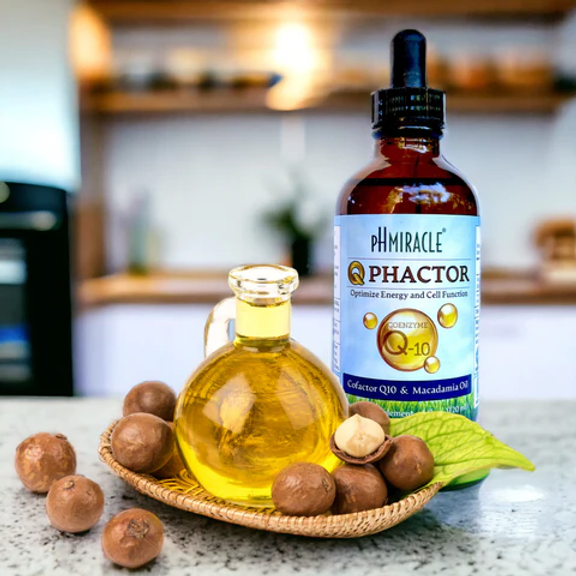The Healthy Benefits of Coenzyme Q10 (CoQ10) with Macadamia Oil
by pH Miracle Products January 24, 2024

CoQ10 is naturally found in the body, with the highest levels in the heart, liver, kidney, and pancreas. It helps generate energy in cells by making the antioxidant adenosine triphosphate (ATP), which is involved in cell energy transfer, and serves as an antioxidant to protect cells against oxidative stress.
Cofactor-Q-10 is necessary for energy production in every cell of the human body. This naturally occurring, vitamin like substance is found primarily in the heart. Cofactor-Q-10 is a nutrient necessary to the functioning of every cell in our bodies. If body levels start dropping, so does our general health.
Scientists estimate that once levels drop below the 25% deficiency level, many acidic states begin to flourish including high blood pressure, heart attack, angina, immune depression, periodontal disease, lack of energy, weight gain, excessive weight loss, and even early death.
Coenzyme Q10 has been clinically shown to support overall cardiovascular health. Co enzyme Q-10 is required for a variety of health pathways, and supports cognition, brain health, and energy levels.
CoQ10 has shown to increase your pure energy and stamina levels, support your nervous and immune system, and act as a powerful antioxidant to help fight free radicals which damage your cells. As humans age, naturally CoQ10 levels decrease – and CoQ10 is essential for cellular energy production, high energy levels, and heart health. CoQ10 is known for its ability to improve endurance and defend cells against the effects of harmful oxidation.
CoQ10 might help reduce blood pressure. Some research also suggests that when combined with other nutrients, CoQ10 might aid recovery in people who’ve had bypass and heart valve surgeries.
CoQ10 may help support the skin, brain, and lungs, as well as protect against chronic diseases like cancer or diabetes.
CoQ10 production decreases as we age.
Some other possible causes of low CoQ10 levels include:
-
genetic defects in CoQ10 synthesis or utilization
-
increased demands by tissues as a consequence of disease
-
nutritional deficiencies
-
mitochondrial diseases
-
oxidative stress due to aging
-
side effects of statin treatments

It may help treat heart failure
CoQ10 may help decrease oxidative stress and enhance heart function, which could be beneficial for improving treatment outcomes in people with heart failure.
Some research suggests that CoQ10 could improve treatment outcomes for people with heart failure.
One analysis of seven reviews concluded that CoQ10 could be beneficial for managing heart failure, especially for those unable to tolerate other treatment methods.
Another review of 14 studies found that people with heart failure who took CoQ10 supplements had a decreased risk of dying and a greater improvement in exercise capacity compared to those who took a placebo.
CoQ10 could also assist with restoring optimal levels of energy production, reducing oxidative damage, and improving heart function, all of which can aid the treatment of heart failure.
It may help with fertility
CoQ10 may help prevent oxidative damage, which could help promote both female and male fertility.
As we age, CoQ10 production slows, making the body less effective at protecting the eggs from oxidative damage.
Supplementing with CoQ10 seems to help and may even reverse this age-related decline in egg quality and quantity.
Similarly, male sperm is susceptible to oxidative damage, which may result in reduced sperm count, poor sperm quality, and infertility.
Several studies have concluded that supplementing with CoQ10 may improve sperm quality, activity, and concentration by increasing antioxidant protection.
It may help supporting healthy skin aging
When applied topically, CoQ10 may protect against damage to the skin, which may help support healthy skin aging.
Harmful elements like cellular damage or a hormonal imbalance can lead to reduced skin moisture and protection from environmental aggressors, as well as the thinning of the layers of the skin.
According to human and animal studies, applying CoQ10 directly to the skin may help reduce oxidative damage caused by UV rays and help decrease the depth of wrinkles and promote antioxidant protection.
It may reduce headaches
Research shows that CoQ10 supplementation may be effective at reducing the frequency, duration, and severity of migraine headaches.
Abnormal mitochondrial function can result in low energy in the brain cells and may contribute to migraine.
Since CoQ10 lives mainly in the mitochondria of the cells, it has been shown it may be beneficial for the treatment of migraine.
One review of five studies found that CoQ10 may effectively reduce the duration and frequency of migraine in children and adults.
Another 2017 study showed that CoQ10 might help reduce the frequency of headaches and make them shorter and less severe.
It may help with exercise performance
CoQ10 may help improve exercise performance by supporting mitochondrial function, decreasing oxidative stress, and reducing fatigue.
Abnormal mitochondrial function can reduce muscle energy, making it hard for muscles to contract efficiently and sustain exercise.
CoQ10 may help exercise performance by decreasing oxidative stress in the cells and improving mitochondrial function.
One study found that CoQ10 supplementation may have helped inhibit oxidative stress and markers of muscle and liver damage in adolescent elite swimmers during their competition phase.
Moreover, supplementing with CoQ10 may help reduce fatigue, which could also potentially improve exercise performance.
It may help with diabetes
CoQ10 could help promote blood sugar control and prevent insulin resistance. It may also decrease oxidative stress and certain risk factors for heart disease in people with diabetes.
Oxidative stress can induce cell damage. This can result in metabolic diseases like diabetes, as well as insulin resistance.
In a 2018 meta-analysis, CoQ10 has been suggested to improve insulin sensitivity and regulate blood sugar levels.
Another study in people with diabetic neuropathy — a type of nerve damage that can occur in people with diabetes — found that taking 100 mg of CoQ10 daily for 12 weeks may have improved HbA1c levels and insulin resistance.
Not only that, but it also may have reduced markers of oxidative stress and harmful compounds, such as advanced glycation end products, compared to a placebo.
It might play a role in cancer prevention
CoQ10 could reduce oxidative stress, which may be involved in cancer development. Though more research is needed, some studies also show that low levels of CoQ10 could be linked to an increased risk of certain types of cancer.
According to some test-tube studies, CoQ10 could block the growth of cancer cells.
Some older studies suggest low levels of CoQ10 may be associated with a higher risk of certain types of cancer, including breast and prostate cancer.
Newer studies have also suggested this with regard to lung cancer.
That said, the National Institutes of Health (NIH) states that CoQ10 has not been shown to be of value as a cancer treatment, so more research needs to be conducted before a definitive claim can be made.
It may be good for the brain
CoQ10 can protect against oxidative damage in the brain, which could potentially protect against cognitive decline. However, more studies in humans are needed.
Mitochondrial function tends to decrease with age, which can lead to the death of brain cells and contribute to conditions like Alzheimer’s and Parkinson’s.
Unfortunately, the brain is very susceptible to oxidative stress due to its high fatty acid content and its high demand for oxygen.
This oxidative stress enhances the production of harmful compounds that could affect memory, cognition, and physical functions.
CoQ10 may reduce these harmful compounds, possibly slowing the progression of Alzheimer’s and Parkinson’s disease, according to some animal studies in 2019 and 2021.
It could protect the lungs
CoQ10 could reduce oxidative damage in the lungs, which may benefit respiratory conditions like asthma or COPD.
Increased oxidative damage in the lungs and poor antioxidant protection, including low levels of CoQ10, can result in lung diseases, such as chronic obstructive pulmonary disease (COPD) and asthma.
Furthermore, some older studies have found that people with these conditions tend to have lower levels of CoQ10.
Another study found that supplementing with CoQ10 and creatine — a compound found in muscle cells — may have improved functional performance, perception of shortness of breath, and body composition in people with COPD.

Macadamia Oil
Macadamia oil is a nutrient-rich, light oil that is renowned for its excellent moisturizing and protective effects on the skin and hair. It is high in essential fatty acids, including palmitoleic, oleic, linoleic and alpha-linoleic acids that nourish the skin, combat dryness and reduce inflammation. It also contains vitamins A, E and a range of minerals.
Macadamia oil helps to rehydrate and smooth skin, reduce the appearance of wrinkles and provide anti-aging benefits. It also has anti-inflammatory properties and can help treat minor skin irritations and cuts.
Macadamia oil helps to condition, smooth and protect the hair.
Benefits of Macadamia Oil
– Anti-Aging
– It packed with antioxidants
– It helps reduce itchiness and rash
– It repairs scars and stretch marks
– It prevents premature wrinkles
– It helps chapped lips
– It has anti-inflammatory properties and can help prevent arteriosclerosis.
Place liquid under the tongue, allow to remain for 15 seconds, and swish before swallowing, or as recommended by your health care professional.

Gently massage 2-3 drops into face and/or body. Use morning and night or as required. Use alone or under your regular moisturizing products. Do not apply to broken skin.

|
* These statements have not been evaluated by the Food and Drug Administration. This product is not intended to diagnose, treat, cure, or prevent any disease. Consult your licensed physician or medical practitioner before using any products, especially if you are taking any drugs or if you are pregnant or nursing. Protect from heat and light. Store out of reach of children. |




